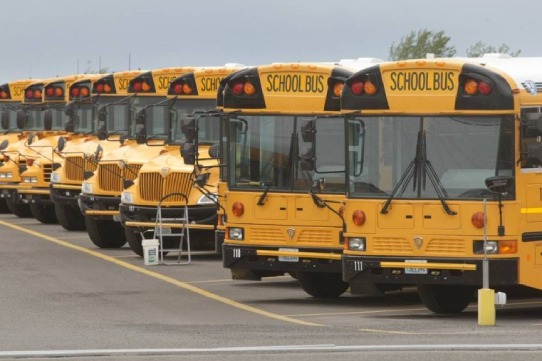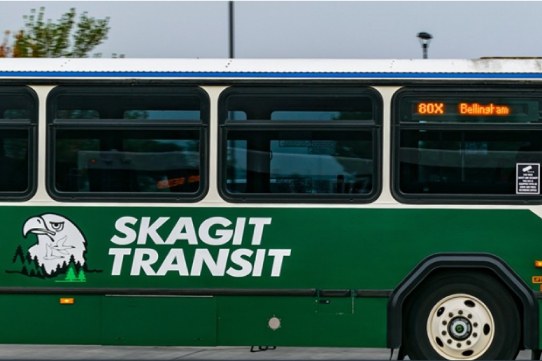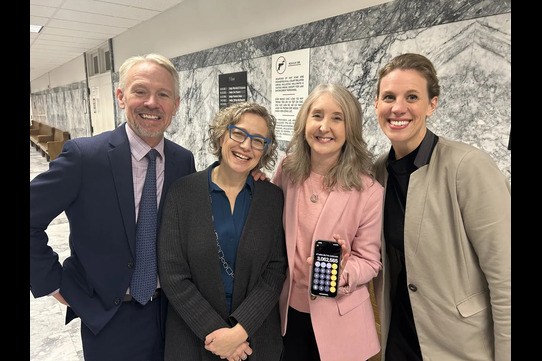Rachel Rasmussen tells her story to the Seattle Times
Former Boeing employee sues, alleging harassment, discrimination at work
Reprinted from the The Seattle Times (Mar. 5, 2024)
By Lauren Rosenblatt
When Rachel Rasmussen, then a Boeing crane mechanic, reported that her manager had made an anti-gay joke, she suddenly found herself facing a one-day suspension over parking tickets.
Later, Rasmussen reported a co-worker for sexual assault — one of many acts of harassment and discrimination she says she faced for more than 10 years as a transgender, lesbian woman working at Boeing’s Everett facility. In response, Boeing suspended that co-worker for one day, the same punishment Rasmussen faced for the alleged parking violation.
I didn’t feel safe. It didn’t feel threat-free. [There was] always a level of anxiety,
Rasmussen said in an interview with The Seattle Times last Friday.
Rasmussen, 55, sued Boeing in federal district court in Seattle last Thursday, alleging the company violated Washington’s laws against harassment, discrimination and retaliation at work. In the lawsuit, Rasmussen recalls years of mistreatment after she transitioned to live consistent with her gender identity in 2010. She had worked at Boeing for nearly 20 years before that — starting in 1989 and working her way through the company’s ranks — and said she hadn’t felt unsafe before her transition.
Co-workers would privately say they knew what was happening was wrong, Rasmussen recalled. But told her they didn’t want to speak up and risk facing the same treatment. She felt absolutely abandoned.
I have to survive on my own,
she remembered thinking.
In 2021, Rasmussen switched from a mechanic to a diversity, equity and inclusion role at Boeing, hoping to escape the mistreatment she faced. Boeing eliminated her DEI role in January. Two months later, Rasmussen is still unemployed and applying for new jobs.
I had used all of the company’s internal resources to try and address the culture issue,
Rasmussen said. This [lawsuit] is the only avenue left.
Boeing declined to comment on the litigation or share more information about its policies around harassment, discrimination and retaliation.
The company has faced similar allegations about its workplace culture in the past — including as recently as December when a former employee sued Boeing in a Pennsylvania district court over allegations of sexual harassment at work and retaliation.
In 2018, a jury found Boeing had created a hostile work environment and failed to prevent racial harassment and discrimination for an employee in its El Segundo, Calif., facility.
Back in 2010, Boeing settled two cases with the U.S. Equal Employment Opportunity Commission after allegations of sexual harassment and retaliation. In one of those cases, a former employee alleged Boeing transferred her to a new unit after she reported gender-based harassment. Less than two months later, Boeing laid her off.
After vowing to enact a zero tolerance
policy, Boeing fired 65 employees for racist or hateful conduct between June 2020 and April 2021.
Rasmussen’s lawsuit comes as Boeing faces scrutiny over its manufacturing and quality-control processes, following an incident in January when a panel of fuselage blew off midflight on a Boeing 737 MAX 9. Since then, regulators have determined that Boeing mishandled the installation of that panel, a door plug that fills what could be an emergency exit in some high-density seating aircraft.
That incident, and others, have led federal safety regulators to investigate Boeing’s quality-control processes and safety culture. A report commissioned after the fatal 2018 and 2019 crashes involving Boeing MAX planes and released last week found the company’s push to improve its safety culture has not taken hold at all levels. The report found a disconnect
between the rhetoric of Boeing’s senior management about prioritizing safety and how front-line employees perceive the reality.
On Monday, the Federal Aviation Administration said its six-week audit of Boeing following the door plug blowout found multiple instances
where Boeing and its supplier, Spirit AeroSystems, failed to comply with manufacturing quality control requirements.
Since the incident, Boeing has planned to implement a series of safety stand-down days where it pauses production to allow employees to participate in a day of training and encourages workers to speak up about concerns and suggestions for improvements.
Rasmussen said last Friday that her experience and the concerns over Boeing’s manufacturing and quality-control processes are all connected. If workers don’t feel safe speaking up about harassment, she can’t imagine they’d feel safe reporting safety concerns. How can you face any other issues without facing retaliation,
she said.
In the lawsuit, Rasmussen alleged co-workers had used homophobic slurs during a diversity training and showed before-and-after photos of her around the office. She also accused co-workers of intentionally using her deadname,
or the name she used before her transition. In one instance, Rasmussen alleged, a co-worker simulated how sex is supposed
to work, using a nut and a bolt.
In 2015, Rasmussen wrote in an email to a senior manager that work feels like an abusive relationship.
In 2020, she wrote in an email to a Boeing vice president that she wants to feel safe and valued.
My first twenty years here as a straight, white guy was effortless,
she wrote in the 2020 email. My last 10 as a lesbian trans-woman have been filled with trauma and problems.
Rasmussen began reporting her mistreatment to Boeing’s human resources department immediately, but the company never took action, according to the lawsuit. At one point, an HR representative told Rasmussen she had to give co-workers a chance to adjust to her being transgender. In another instance, HR responded that we can’t force employees to like you or speak to you.
Having worked at the company for decades already, Rasmussen said she wasn’t surprised by how her co-workers treated her, but she was surprised by HR’s response. She had believed Boeing’s statements about inclusion and belonging, she recalled.
You see this company that makes these impressive sounding, but ultimately hollow and meaningless promises, to their employees,
said Jay Free, an attorney with Bloom Law who is representing Rasmussen. Over and over again, they betrayed those promises.
In 2021, Rasmussen switched roles at Boeing to escape harassment and ensure she wouldn’t have to work alongside the colleague she had accused of sexual assault. The new role was part of Boeing’s DEI efforts and was meant to encourage more women to join Boeing’s workforce — but Boeing eliminated the position in January.
It’s unclear if Boeing eliminated other DEI roles at that time. Free said that is something they are hoping to uncover as the legal process unfolds. Boeing declined to comment.
Rasmussen applied for 29 internal job openings after losing her job, according to the lawsuit. After nearly 35 years with the company, Boeing offered her only entry-level roles.
Rather than changing its culture to emphasize safety,
the lawsuit reads, Boeing forced out a good employee who refused to stay silent about employee rights.

Jose Hernandez wins 1.9mil settlement from Pasco School District
The Pasco School District pays $1.9 million to settle a federal lawsuit filed by former transportation director Jose Hernandez, who endured nearly a decade of racial harassment and discrimination.
Christopher Stamey files suit against Skagit Transit
Christopher Stamey has filed a whistleblower retaliation lawsuit against Skagit Transit, alleging he was fired after reporting financial misconduct.
Teresa Levine wins case against North Shore Utility District
A jury awarded a former Northshore Utility District employee more than $3 million this month in her gender discrimination and retaliation case.

Jose Hernandez wins 1.9mil settlement from Pasco School District
The Pasco School District pays $1.9 million to settle a federal lawsuit filed by former transportation director Jose Hernandez, who endured nearly a decade of racial harassment and discrimination.
Christopher Stamey files suit against Skagit Transit
Christopher Stamey has filed a whistleblower retaliation lawsuit against Skagit Transit, alleging he was fired after reporting financial misconduct.
Teresa Levine wins case against North Shore Utility District
A jury awarded a former Northshore Utility District employee more than $3 million this month in her gender discrimination and retaliation case.





